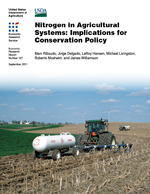Nitrogen in Agricultural Systems: Implications for Conservation Policy
- by Marc Ribaudo, Jorge Delgado, LeRoy Hansen, Michael Livingston, Roberto Mosheim and James Williamson
- 9/22/2011
Overview
Nitrogen is an important agricultural input that is critical for crop production. However, the introduction of large amounts of nitrogen into the environment has a number of undesirable impacts on water, terrestrial, and atmospheric resources. This report explores the use of nitrogen in U.S. agriculture and assesses changes in nutrient management by farmers that may improve nitrogen use efficiency. It also reviews a number of policy approaches for improving nitrogen management and identifies issues affecting their potential performance. Findings reveal that about two-thirds of U.S. cropland is not meeting three criteria for good nitrogen management related to the rate, timing, and method of application. Several policy approaches, including financial incentives, nitrogen management as a condition of farm program eligibility, and regulation, could induce farmers to improve their nitrogen management and reduce nitrogen losses to the environment.
Download
-
Entire report
Download PDF -
Report summary
Download PDF -
Zip file
Download ZIP

